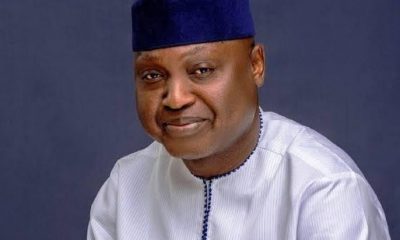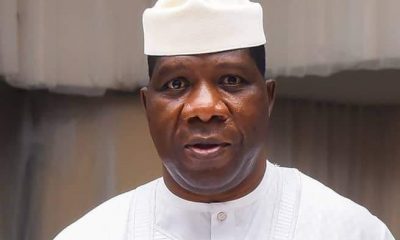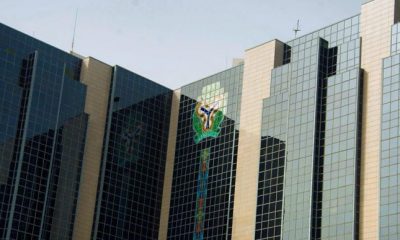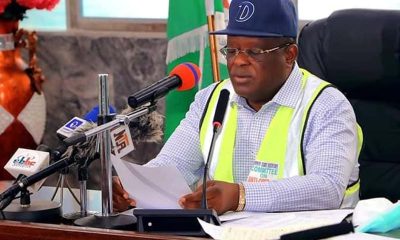Business
Analysts fear economy already in recession
Published
9 years agoon
By
Publisher
• Call for appointment of turnaround managers
• Say reduction in CRR not enough
By DANLADI BATURE
THERE are fears that the Nigerian economy is already witnessing a recession, especially as the Gross Domestic Product (GDP) has now slipped for four consecutive quarters, beginning in the second quarter of 2014.
The analysts’ concern is that the overall macro-economic environment remained fragile as President Buhari drags in constituting his cabinet, which should set the policy direction to spur the economy.
Consequently, they say appointment of competent and credible Nigerians as ministers, introduction of policy which point the country in a clear direction and improvement in the ease of doing business, among other steps, could be the antidote to economic decline and stunted growth.
While acknowledging the reduction of Cash Reserve Ratio (CRR) by the Monetary Policy Committee from 31 to 25 percent as step in the right direction, some analysts who spoke with National Daily at the weekend, say more confidence through faster policy implementation is needed to engender confidence for banks to lend to critical sectors of the economy.
Their fears are further heightened by the fact that the CBN is approaching its monetary policy limit, adding that the expected growth would be achieved with the complimentary actions from the fiscal authorities, particularly, in the area of longer term structural reforms.
They also observe that the possibility of the additional liquidity in the system, arising from CRR reduction, could lead to increased demand pressure for foreign exchange, prompting further action from the CBN, which may not be available.
Economic recession is a period of general economic decline, usually accompanied by a drop in the stock market, an increase in unemployment, and a decline in the housing market.
A major indicator is two consecutive quarters of negative economic growth, as measured by the country’s Gross Domestic Products, (GDP)
But, growth had come under severe strain, arising from declining private and public expenditures, mostly caused by low government revenues, and the impact of non-payment of salaries at state and local government levels is dampening consumer demand.
Central Bank of Nigeria (CBN) governor, Godwin Emefiele, last Tuesday raised concerns that with the economy seeing two consecutive quarters of slow growth, it could slip into recession in 2016 if proactive steps are not taken to revive growth in key sectors of the economy.
Analysts say going by this definition, the local economy is already in recession, and point to declines in component measures of economic activity (GDP) such as consumption, investment, government spending, and net export activity, all of which suggest urgent polices are needed to fix the economy before a depression sets in.
Analysts at Renaissance Capital, (Rencap) said, “A core reason attributed to the CRR ease was the MPC’s desire to see the banks invest more in critical sectors such as agriculture and mining, to help drive growth and reduce unemployment.
“We do not see this happening near term and think the decision is likely to put downward pressure on treasury yields as banks aggressively invest the released CRR in T-Bills and bonds.”
They added that while they agree that lower CRR could improve liquidity, help lower funding costs near term, “we do not expect the banks to re-price loans that quickly, so some short term margin improvement should come through, but more reflective in 4Q15.
Afrinvest analysts said, “Despite the projected improvement in banking sector performance and capital market activity, the impacts of the decision on the real sector, especially in an atmosphere of slowing growth, will be majorly determined by the complimentary actions from the fiscal authorities in terms of longer-term structural reforms.
” We believe that monetary policy may be already approaching its limit in stimulating growth with the authorities only constrained to the use of the CRR instruments which impacts are limited to the financial sector. We also note that the possibility of the additional liquidity in the system may lead to increased demand pressure for FX which may prompt needs to further introduce administrative tools to manage the exchange rate.”
“The reality on ground is that our economy has been in recession. In the second half of 2014, the GDP really dropped and it dropped further into the first quarter of 2015. The implication is that if your GDP drops three times consecutively, the economy will enter recess.
“So the country’s economy actually entered recession officially as at the end of the first quarter in 2015,” Biodun Adedipe, an economist and Chief Consultant, B. Adedipe Associates, said.
The economy of Africa’s largest country by GDP, after peaking at 6.54 percent in the second quarter of 2014 moved lower to 6.23 percent in the third quarter and then settled at 5.94 percent in the fourth quarter, according to the National Bureau of Statistics (NBS).
Output growth in the first half of 2015 trended further downwards from the level in the fourth quarter of 2014, mainly on account of softening oil prices. According to the NBS, real GDP grew by 2.35 per cent in the second quarter of 2015, a second consecutive quarterly less-than-expected performance and a significant decrease from the 3.96 and 6.54 per cent seen in the preceding quarter and corresponding period of 2014, respectively.
The federal data office projects Real GDP to stabilise at 2.63 per cent in 2015, still lower than the 6.22 per cent recorded in 2014, mainly driven by the non-oil sector.
Experts say the first priority for Buhari’s incoming economic team should be to deliver a budget that would be backed by policies to revive the economy and stimulate growth before the economic conditions worsens.
“What the government of today has to do in line with the vision of the president is to improve on our macro economic statistics,” Adedipe stated.
“As much of what we consume is imported, there will be a huge demand for foreign currencies and this will have an effect on the structure of our economy, so we need to say look, our economy grew 6.4% in the last 14 years but it didn’t create jobs, so how do we create jobs? It is by producing here, that way, we will boost the economy out of recession which will also lessen the demands for foreign currencies.”
Bismark Rewane, CEO Financial Derivatives, however sees the economy recovering by the last quarter of 2015 as possible budgetary impact begins to be seen, along with an improvement in refined oil output, among other factors.
The CBN also projects that the overall outlook for economic activity is expected to improve on account of sustained improvement in the supply of power and refined petroleum products and progress with counter-insurgency in the North-East axis.
You may like


Oyebanji demands FG’s support for Ekiti tourism initiative


Economic crisis: Ibadan residents protest high cost of living


Breaking: Banks to pay diaspora remittances in Naira


FG to go after economic saboteurs in 2024


Nigeria’s economy maintains nine-quarter consecutive growth – CBN


2023 Election: Kwankwaso pledges climate smart economy
Trending

 Aviation7 days ago
Aviation7 days agoForeign airlines using lower price to force Air Peace from Nigerian-London route–Onyema

 Business4 days ago
Business4 days agoDollar crashes further against Naira at parallel market

 Business4 days ago
Business4 days agoRecapitalisation: Zenith Bank to raise funds in international capital market

 Education4 days ago
Education4 days agoArmy reveals date for COAS 2024 first quarter conference

 Crime4 days ago
Crime4 days agoFleeing driver injures two on Lagos-Badagry expressway

 Business1 week ago
Business1 week agoCrude oil sells above $90 per barrel as ceasefire deal between Hamas, Israel fades

 Business6 days ago
Business6 days agoLagos Calabar Coastal Road project will offer significant economic benefits–Umahi

 Business4 days ago
Business4 days agoZenith Bank surpasses N2trn earnings milestone

